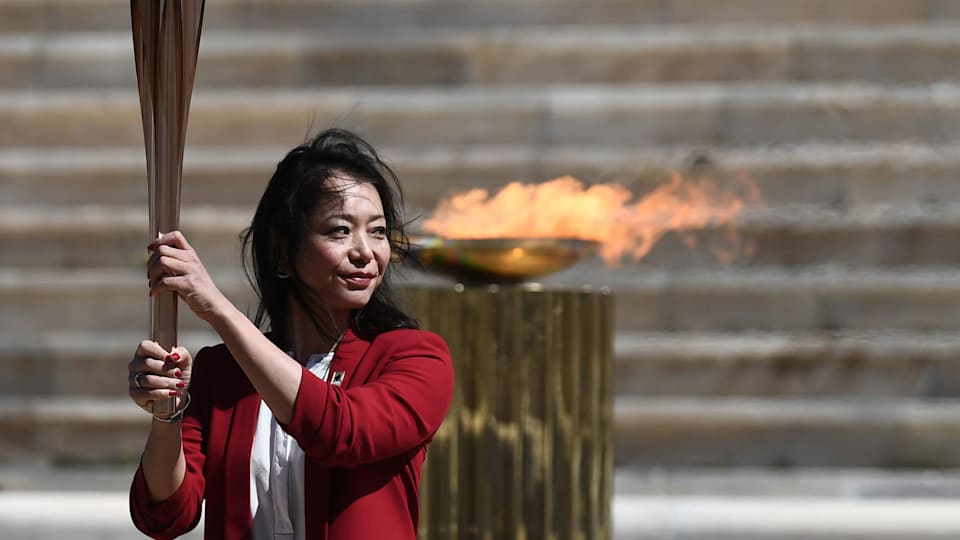Imoto Naoko: Japanese swimmer proud to bring message of hope
Imoto Naoko was part of the Japan swimming team at the Atlanta 1996 Olympic Games, where she finished fourth in the 4x200 freestyle relay. Whilst that was certainly a fond memory for her, ever since, the 43-year-old former Olympic swimmer has devoted her life to helping others.

Chosen by Tokyo 2020 to be the person to hand over the torch, Imoto received the Olympic flame from HOC President and IOC Member Mr. Spyros Capralos at the handover ceremony at the Panathenaic Stadium in Athens, and will travel back to Japan with the flame and the rest of the Japanese delegation. Imoto considers this a highly symbolic role which she measures with a lot of respect and meaning. “When I received the call I was very surprised and felt this could not be true. The Olympic flame represents a lot to me and to many people despite the difficulties we are facing right now with the corona virus”, she said.
Hope lights our way
For Imoto, the symbol of the Olympic flame has a stronger meaning as the flame will travel from Greece to Fukushima, which is one of the prefectures in Tohoku region that is still undergoing reconstruction efforts following the devastating earthquake nine years ago. “The flame came from Ancient Olympia here in Greece and it goes to Fukushima where the earthquake hit in 2011," she says. “It will go through all Japan and finally arrive in Tokyo. Along the way, it will carry so much people’s hopes so that it will be such a powerful flame by the time it arrives in Tokyo. In these difficult times, it will be even more meaningful because vulnerable people especially the elderly people or children are struggling at the moment. All the people who will carry this flame will convey this message of hope during this relay.”
This journey is particularly emotional for Imoto, as she actually worked to help people in the earthquake area in Japan. “Nine years ago I was in Miyagi and Iwate working for UNICEF as part of the response team and I saw the tremendous damage. After nine years, I do understand the construction has not yet been completed and a lot of people are still suffering but there has to be a strong message of hope”, she explains.
Working for UNICEF
Nowadays, Imoto works in Greece with migrants and refugees for UNICEF. Another very meaningful role for her. “I am Chief of Education in UNICEF's partnership office in Greece; I came here about three-and-a-half years ago as part of the response team for the refugees and migrants crisis. At the moment there are more than a 100,000 refugees and migrants in Greece, and millions more in Europe, coming from Afghanistan, Syria, Iraq, Pakistan and so many countries.”
Even though she is aware of the issues Europe has to accommodate and integrate these refugees into society, she believes in the importance of using education to help marginalised refugees and children, in particular.
“Every child has the right to access to basic things such as education, water, health services and the right to have a future. My little part of support is about education. It is my job to bring them education and helping the Greek government by making sure children are in school and that they receive quality education”, she says.
As a former athlete, Imoto is aware of the importance sport has for these refugee children. In fact, sport is an important element of the education programmes she is currently managing in Greece. “I am working in different refugee camps where I bring education," she explains. "But children cannot concentrate if they are not happy and ready to go to school. We use sport for kids to relax, feel part of the class, bond with their friends but also deal with their frustration and traumas they carry from their past. That’s why sport is an important piece of the puzzle.”
Of course, the IOC Refugee Olympic Team resonates very strongly for her, considering the "heart-breaking" choice athletes from war-torn countries face. “I am very excited about the Refugee Olympic Team, which started in Rio in 2016. These people are forced to flee their countries and are no longer able to represent their countries. Devoting your life to your sport to represent your country at the Olympics is so meaningful and then, because of wars, violence and atrocities, having to flee and not being able to represent your country - it is heart-breaking. But now they have to have the right to participate in the Olympics, and it is great thing.”
